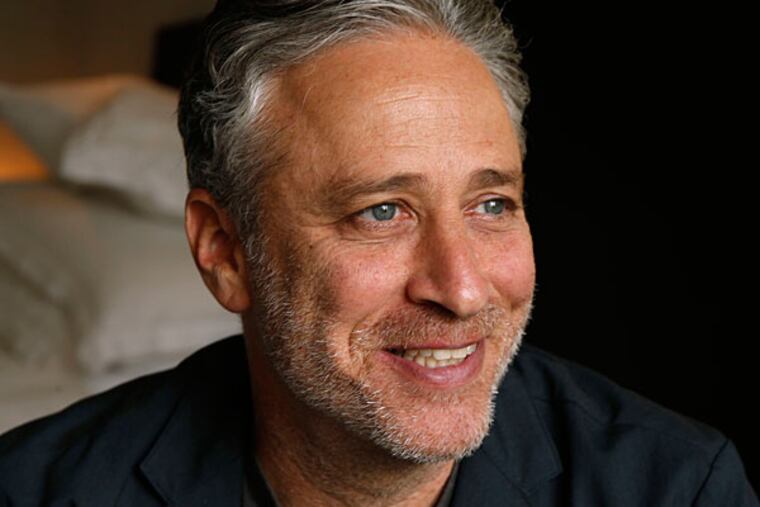Jon Stewart talks 'Rosewater,' 'Daily Show'
Jon Stewart talks about taking a leave of absence from "The Daily Show" to make "Rosewater," the story of imprisoned Iranian journalist Maziar Bahari.

IN JON STEWART'S "Rosewater," freedom-loving people armed with the modern tools of communication rattle the forces of oppression.
It's a profile of imprisoned Iranian journalist Maziar Bahari, which starts as an examination of one individual's resilient spirit, and expands into a portrait of a people rising up against a government ultimately powerless to stop a tech-fed flood of information.
Right on!
You leave the theater with a bounce in your step.
Then your own tech-fed flood of information reminds you that the U.S. surveillance state is now hassling our own journalists, that our leaders are now joint-venturing with the same Iranian mullahs who imprisoned Bahari. And we're doing it to defeat ISIS - a terrorist organization that's also skilled at using the modern tools of social media.
I ask Stewart if his movie - written when the Arab Spring was minty fresh, before the rise of ISIS and the utter collapse of Syria and Iraq - still warrants its implied optimism.
Absolutely, he says.
"I think part of our problem is we have to lower our expectations. We expect perfection," says Stewart.
And an instant sort of perfection at that: fully functional Democratic institutions in an instant.
"We're like, 'Hey, man, it's been 90 minutes,' " he said, referring to Western expectations of progress in regions with little tradition of democracy.
Stewart also believes that folks should not believe all the ISIS hype.
"I think we've invested in ISIS these incredible powers they don't possess," said Stewart, who doesn't believe they are an existential threat to the United States. "We've made them out to be this unstoppable monster. They're not the X-Men. They're a bunch of guys without an air force."
He also cautions against over-simplifying ISIS, or labelling all of its constantly shifting factions with the tag of "pure villainy."
Fair enough, but there are factions that have done evil things. I asked Stewart how the U.S., home of Madison Avenue, could possibly be losing a marketing campaign to an outfit that puts beheadings on the Internet. Why would three young women from Denver, for instance, try to go to Syria as ISIS volunteers?
"I don't know," he said. "You have serial killers, and you have women who write to them in prison. But you can't look at a few outliers and turn that into an insidious trend."
Stewart, host of "The Daily Show," has made a living criticizing cable news, often for the way it hypes stories like ISIS (he also mentions Ebola).
Stewart's been doing this for 16 years, and has talked in recent years about needing a break from the "Daily Show" routine. He was granted time off last year to write and direct his movie about Bahari, imprisoned in Iran shortly after appearing in a "Daily Show" spoof.
Stewart says that the movie is all about Bahari's triumph, and has deflected any suggestion that the movie is at all autobiographical.
But speculation persists - in "Rosewater," Bahari takes flak from Iranian activists who want him to get off the sideline and get in the game. It's easy to see why some critics feel that in "Rosewater" Stewart is evaluating his own feelings about being a satirist who speaks truth to power, but never succeeds in substantially reforming or altering that power.
"If there's anything like that in 'Rosewater,' it's certainly not conscious," he said. "Do I believe journalists and satirists can be agents of change? I don't know. In general, I believe that in any system, there has to be a foundation in place that's ready for change. That change without that foundation is very difficult."
Stewart cited Egypt, where liberals and moderates set in motion changes that created power vacuums filled by more conservative factions. "If there are really no institutions in place to fill the void, what happens is the Muslim Brotherhood comes in," he said. "They were the most organized."
In the more trivial world of fake news, there is also growing speculation about regime change at the "Daily Show." Stewart's contract is up next fall, and he's shown no sign that he's keen to renew.
Stewart didn't answer questions about his future, specifically. He talked generally about social commentary/satire as a form that will always attract comedians.
"I built on whatever was already there, already standing, on all the work by people who'd done similar things," he said. "And that next person will take it to that next level."